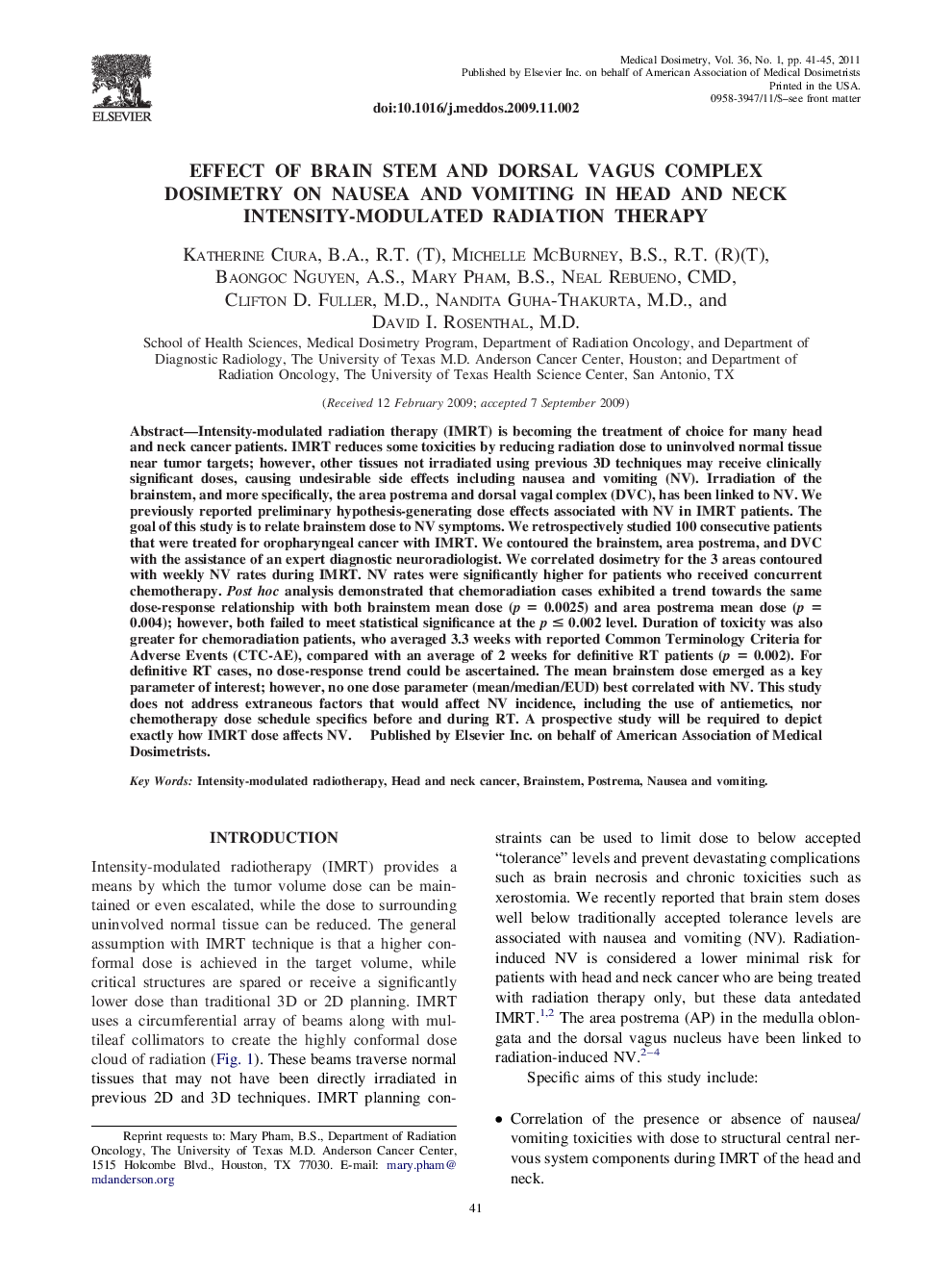| کد مقاله | کد نشریه | سال انتشار | مقاله انگلیسی | نسخه تمام متن |
|---|---|---|---|---|
| 1880018 | 1042861 | 2011 | 5 صفحه PDF | دانلود رایگان |
عنوان انگلیسی مقاله ISI
Effect of Brain Stem and Dorsal Vagus Complex Dosimetry on Nausea and Vomiting in Head and Neck Intensity-Modulated Radiation Therapy
دانلود مقاله + سفارش ترجمه
دانلود مقاله ISI انگلیسی
رایگان برای ایرانیان
کلمات کلیدی
موضوعات مرتبط
مهندسی و علوم پایه
فیزیک و نجوم
تشعشع
پیش نمایش صفحه اول مقاله

چکیده انگلیسی
Intensity-modulated radiation therapy (IMRT) is becoming the treatment of choice for many head and neck cancer patients. IMRT reduces some toxicities by reducing radiation dose to uninvolved normal tissue near tumor targets; however, other tissues not irradiated using previous 3D techniques may receive clinically significant doses, causing undesirable side effects including nausea and vomiting (NV). Irradiation of the brainstem, and more specifically, the area postrema and dorsal vagal complex (DVC), has been linked to NV. We previously reported preliminary hypothesis-generating dose effects associated with NV in IMRT patients. The goal of this study is to relate brainstem dose to NV symptoms. We retrospectively studied 100 consecutive patients that were treated for oropharyngeal cancer with IMRT. We contoured the brainstem, area postrema, and DVC with the assistance of an expert diagnostic neuroradiologist. We correlated dosimetry for the 3 areas contoured with weekly NV rates during IMRT. NV rates were significantly higher for patients who received concurrent chemotherapy. Post hoc analysis demonstrated that chemoradiation cases exhibited a trend towards the same dose-response relationship with both brainstem mean dose (p = 0.0025) and area postrema mean dose (p = 0.004); however, both failed to meet statistical significance at the p ⤠0.002 level. Duration of toxicity was also greater for chemoradiation patients, who averaged 3.3 weeks with reported Common Terminology Criteria for Adverse Events (CTC-AE), compared with an average of 2 weeks for definitive RT patients (p = 0.002). For definitive RT cases, no dose-response trend could be ascertained. The mean brainstem dose emerged as a key parameter of interest; however, no one dose parameter (mean/median/EUD) best correlated with NV. This study does not address extraneous factors that would affect NV incidence, including the use of antiemetics, nor chemotherapy dose schedule specifics before and during RT. A prospective study will be required to depict exactly how IMRT dose affects NV.
ناشر
Database: Elsevier - ScienceDirect (ساینس دایرکت)
Journal: Medical Dosimetry - Volume 36, Issue 1, Spring 2011, Pages 41-45
Journal: Medical Dosimetry - Volume 36, Issue 1, Spring 2011, Pages 41-45
نویسندگان
Katherine B.A., R.T. (T), Michelle B.S., R.T. (R)(T), Baongoc A.S., Mary B.S., Neal CMD, Clifton D. M.D., Nandita M.D., David I. M.D.,